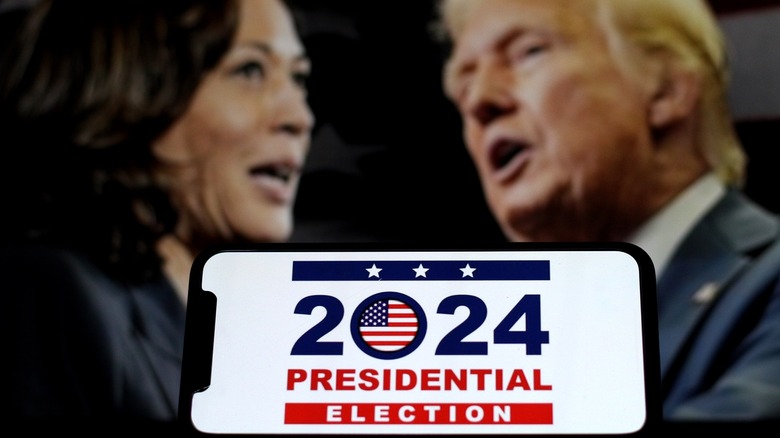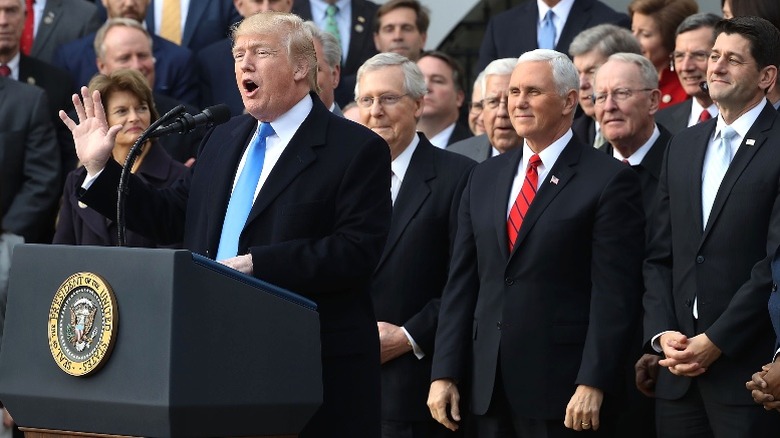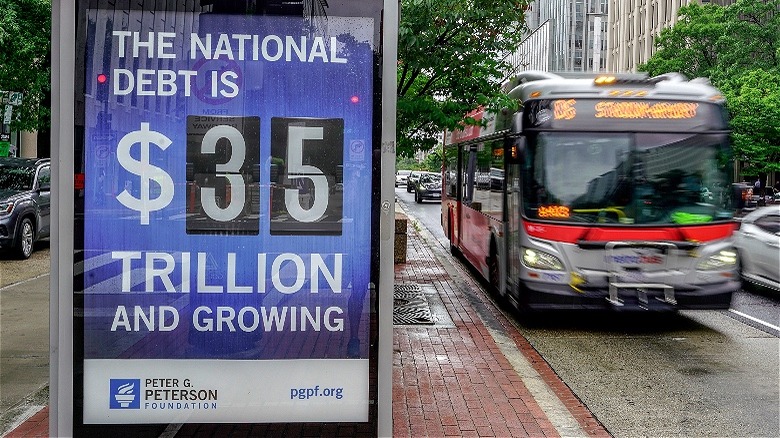Who Will Lower America's Taxes More, Donald Trump Or Kamala Harris?
With the U.S. presidential election fast approaching in November, policy questions are front and center for many voters. While certain proposals like eliminating taxes on tips have become election flash points, there's still a lot left to understand about the Democratic and Republican candidates' economic policy positions. In particular, how their policies might change your taxes under each administration.
While the sudden upending of the election (on July 21, 2024, when President Joe Biden announced he wouldn't seek a second term) left Vice President Kamala Harris with a significantly shorter time frame for releasing proposed policies, she was able to unveil some of her economic plans just ahead of the Democratic National Convention. In it, she laid out what she called an "opportunity" economy aimed at benefiting the middle class through measures like expanded down-payment assistance for first-time homebuyers, expanded tax credits for families, and even a federal ban on grocery price gouging.
On the flip side, former President Donald Trump has proposed the continuation of both personal income and corporate tax cuts that were put in place during his term as president (2017 to 2021). To offset the financial loss of that revenue, Trump has proposed increasing tariffs, mainly on imported goods from China.
With proposed tax changes and potential credits on everything from earned income to children to homeownership, the potential for your taxes to increase ultimately varies widely depending on your income level and the credits you and your family might qualify for. Let's dive into some of the existing tax policies that will be at the heart of any future tax changes.
Existing tax policies
A significant consideration for whoever the next president is relates to tax cuts that were initially signed into law by Donald Trump. The Tax Cuts and Jobs Act (TCJA) of 2017 made significant tax code changes that expanded existing federal tax brackets, lowered the top tax rate, slashed corporate tax rates, and cut personal and estate taxes. Many of the provisions in the law are set to expire at the end of 2025; this means whoever the next president is has the ability to extend or let these policies expire, which could directly impact your taxes (not to mention Social Security).
For starters, the TCJA tax cuts largely benefitted the extremely wealthy, and studies found that the cuts didn't result in the law's originally promised "trickle-down" benefits. Instead, one study ("The Efficiency-Equity Tradeoff of the Corporate Income Tax: Evidence from the Tax Cuts and Jobs Act") found that earnings did not change for workers in the bottom 90% of wealth distribution within a company, but did increase for workers in the top 10%. Even worse, economists estimate the TCJA added an additional $1 trillion to $2 trillion to the national debt due to the loss of federal revenues from these tax cuts.
Estimates show the United States could add another $4.6 trillion to its budget deficit should the expiring provisions in the Tax Cuts and Jobs Act be extended through 2033. While Trump has stated he would extend TCJA provisions, Kamala Harris has proposed modified extensions for some elements of the existing law.
The bottom line
According to the Tax Foundation, more than 60% of all taxpayers could face higher taxes in 2026 without an extension of these tax cuts. Kamala Harris looks to extend the personal income tax cuts initially established by the TCJA, but only for those earning less than $400,000 a year. However, not all of the TCJA is safe. For instance, Harris has proposed increasing the current corporate tax rate (which went down to 21% from 35% with the TCJA) to 28% as a way to boost federal income and offset the country's growing budget deficit (the national debt recently surpassed $35 trillion).
Mark Zandi, chief economist at Moody's Analytics, explained to NBC News why Harris focusing on the deficit is important, "It's a clear signal that whatever the policies, [Harris' campaign] plan[s] to be fiscally disciplined. And that is a bit of a flip. Historically, being fiscally disciplined and focused on budget deficits has been a Republican rally cry." The nonprofit Committee for a Responsible Federal Budget estimates Harris' economic policies (like increasing child tax credits and expanding housing assistance) will cost ~$2 trillion; meanwhile, a Harris administration would aim to raise $5 trillion in tax revenues over the next 10 years.
Donald Trump's policies offer ~$5 trillion worth of combined tax breaks and spending; he proposes tariffs of 10% to 20% on more than $3 trillion of annual imports. With all these numbers in mind, it's important to remember that any proposed tax cut or tax credit promised during the campaign isn't a guarantee of actual tax policy in 2025.


